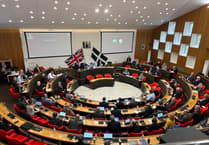Cornwall Councillors in the Post area are calling for tougher action to crack down on water companies and farmers polluting Cornish rivers and beaches.
A motion being debated at Cornwall Council this week called for an end to all sewage discharges affecting bathing waters, shellfish harvesting areas and high-priority nature sites by 2030.
Dominic Fairman, the Liberal Democrat Councillor for St Teath, proposed the motion calling on the Government to impose legally binding targets to end untreated sewage discharges, strengthen testing of water quality and provide more support to farmers to reduce pollution. He says that the privatised water companies have put profits ahead of protecting the environment.
He said: “The fact that raw sewage is regularly discharged into our rivers and seas is abhorrent. When the water companies were privatised in 1989, all their debts were wiped out to help them to meet their legal duty to only discharge sewage into the environment in “exceptional circumstances”. What actually happened in the intervening years is that they have leveraged over £50-billion pounds of debt back onto their balance sheets in order to help fund over £72-billion of shareholder dividends and executive pay.
“The “exceptional circumstance” clause has been completely abused, and for instance in my division the overflow for the Treatment Works in Delabole discharges into the River Allen over 250 days of the year for a total of 2,000 hours.”
Leigh Frost, the Liberal Democrat Councilor for Bodmin St Petroc’s says that affordable housing in Bodmin has been blocked because the local sewage treatment works can’t handle their waste, yet changes to rules for septic tanks have actually led to more pollution entering the River Camel.
She added: “Septic tank sewage from the whole of East Cornwall and West Devon must now be tankered to Nanstallon, but in 2021 this facility discharged for a total of 943 hours into the River Camel. So, we find ourselves in the horrible position of being in the midst of a housing crisis, unable to build homes for local people that desperately need them due to its impact on the Camel, yet on the other hand we are expected to take in waste from other areas to clean up! The situation stinks worse than the sludge in those tankers!”
l What do you think? Write to us: [email protected]





Comments
This article has no comments yet. Be the first to leave a comment.